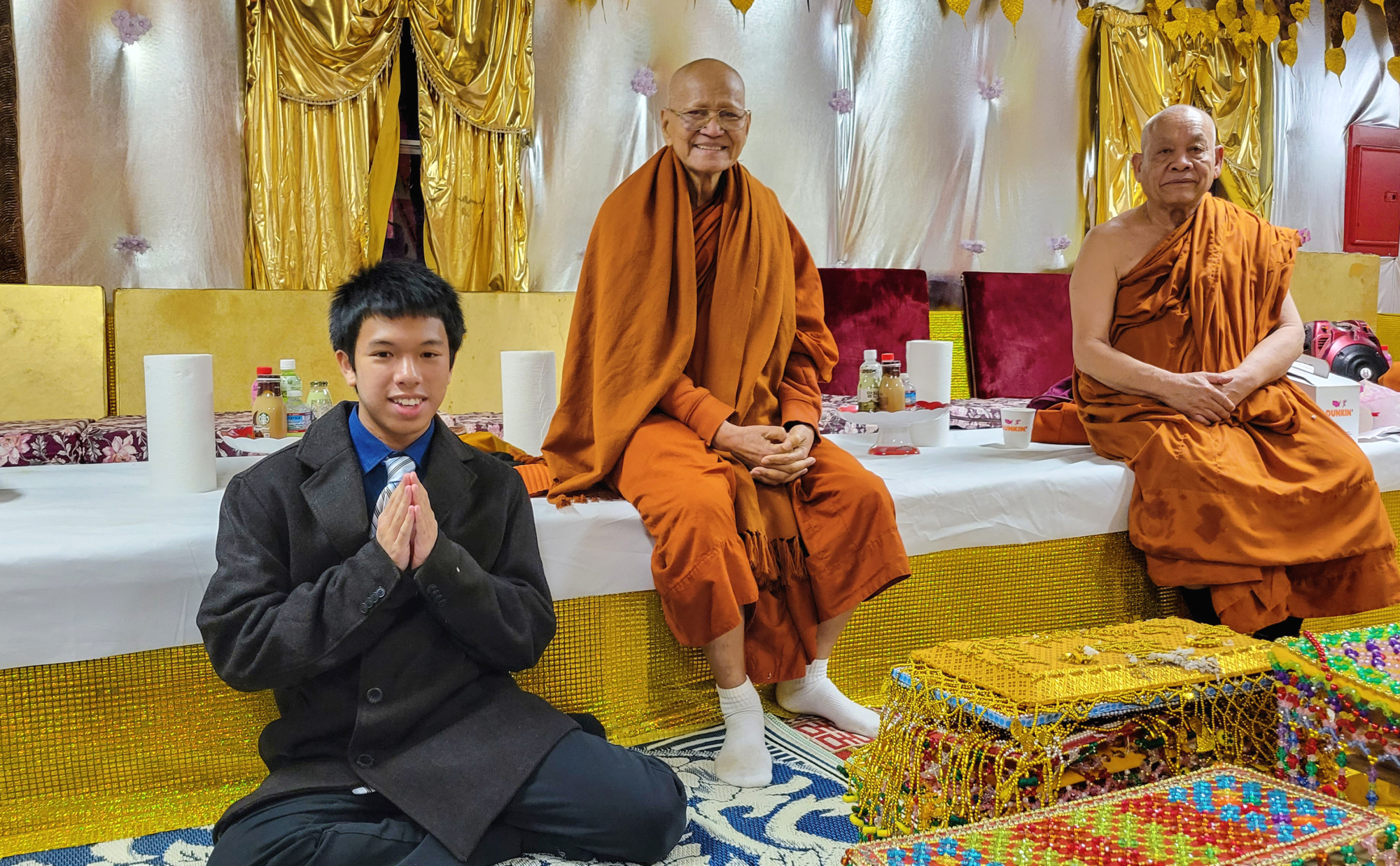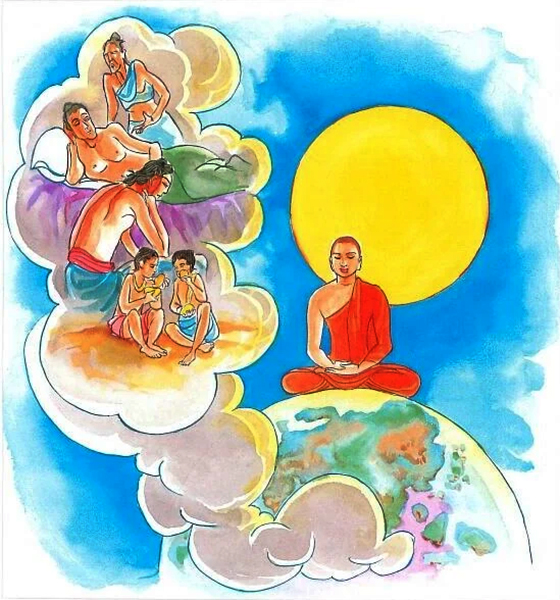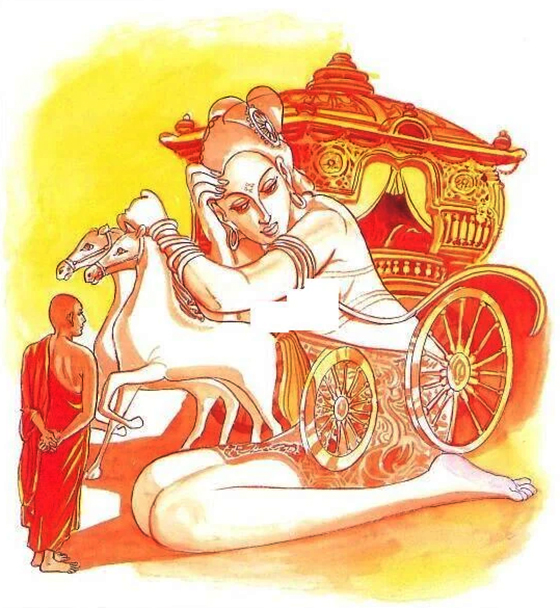-
Love, in the sense of metta, used by Buddha 5 November 15, 2022 -
The Story of Thera Sammajjana Comment November 1, 2022Verse 172: He, who has been formerly unmindful, but is mindful later on, lights up the world with the light of Magga Insight as does the moon freed from clouds.
The Story of Thera Sammajjana
While residing at the Jetavana monastery, the Buddha uttered Verse (172) of this book, with reference to Thera Sammajjana.
Thera Sammajjana spent most of his time sweeping the precincts of the monastery. At that time, Thera Revata was also staying at the monastery; unlike Sammajjana, Thera Revata spent most of his time in meditation or deep mental absorption. Seeing Thera Revata’s behaviour, Thera Sammajjana thought the other thera was just idling away his time. Thus, one day Sammajjana went to Thera Revata and said to him, “You are being very lazy, living on the food offered out of faith and generosity; don’t you think you should sometimes sweep the floors or the compound or some other place?” To him, Thera Revata replied, “Friend, a bhikkhu should not spend all his times sweeping. He should sweep early in the morning, then go out on the alms-round. After the meal, contemplating his body he should try to perceive the true nature of the aggregates, or else, recite the texts until nightfall. Then he can do the sweeping again if he so wishes.” Thera Sammajjana strictly followed the advice given by Thera Revata and soon attained arahatship.
Other bhikkhus noticed some rubbish piling up in the compound and they asked Sammajjana why he was not sweeping as much as he used to, and he replied, “When I was not mindful, I was all the time sweeping; but now I am no longer unmindful.” When the bhikkhus heard his reply they were sceptical; so they went to the Buddha and said, “Venerable Sir! Thera Sammajjana falsely claims himself to be an arahat; he is telling lies.” To them the Buddha said, “Sammajjana has indeed attained arahatship; he is telling the truth.” Continue reading
-
When your mind is tranquil 2 October 21, 2022When your mind is tranquil, all your ill-thoughts cease. ~Unknown
Do you feel that praise is easy to let go of and criticism is hard to let go of? They are really equal. But when we are praised we don’t feel disturbed; we are pleased, but it’s not a sharp feeling. Criticism is painful, so we feel it’s hard to let go of. Being pleased is also hard to let go of, but we are partial to it so we don’t have the same desire to get rid of it quickly. The delight we take in being praised and the sting we feel when criticized are equal. They are the same. But when our minds meet these things we have unequal reactions to them. We don’t mind being close to some of them. ~Ajahn Chah
-
Detachment and Compassion in Early Buddhism Comment October 19, 2022By Elizabeth J. Harris
To people looking at Buddhism through the medium of English, the practice of compassion and detachment can appear incompatible, especially for those who consider themselves to be socially and politically engaged. In contemporary usage, compassion brings to mind outward-moving concern for others, while detachment suggests aloofness and withdrawal from the world. Yet Buddhism recommends both as admirable and necessary qualities to be cultivated. This raises questions such as the following:
If compassion means to relieve suffering in a positive way, and detachment to remain aloof from the world, how can the two be practiced together?
Does detachment in Buddhism imply lack of concern for humanity?
Is the concept of compassion in Buddhism too passive, connected only with the inward-looking eye of meditation, or can it create real change in society?
It is certainly possible to draw sentences from Buddhist writers which seem to support a rejection of outward concern for others. For example, Edward Conze has written, “The Yogin can only come into contact with the unconditioned when he brushes aside anything which is conditioned.”[1] Similarly, G.S.P. Misra writes, “In the final analysis, all actions are to be put to cessation… The Buddha speaks of happiness involved in non-action which he further says is an integral part of the Right Way (sammaa pa.tipadaa).[2] Taken in isolation and out of context, these remarks can give the impression that the path to Nibbaana implies developing a lack of concern towards everything in sa.msaara. But is this inference sound? I would argue that it is not. Continue reading
-
The gift of peace and tranquility 1 October 19, 2022
Jendhamuni with Buddhist friends, originally from Nepal, at Kiryvongsa Bopharam, Peace Meditatioin Center on July 3, 2022.
Some people give the gift of peace and tranquility to every life they touch. They are always who they really are. They are blessedly reliable, dependably good, predictably pleasant, loved and treasured by all who know them. You are one of those people. You are a gift of peace and tranquility. ~Anonymous Continue reading
-
Naturally stress-free and tranquil life Comment October 18, 2022 -
The Story of Prince Abhaya Comment October 18, 2022Verse 171: Come, look at this world (i.e., the five khandhas), which is like an ornamented royal carriage. Fools flounder in this world of the khandhas, but the wise are not attached to it.
The Story of Prince Abhaya
While residing at the Veluvana monastery, the Buddha uttered Verse (71) of this book, with reference to Prince Abhaya (Abhayarajakumara).
On one occasion, Prince Abhaya triumphantly returned after suppressing a rebellion at the frontier. King Bimbisara was so pleased with him that for seven days, Abhaya was given the glory and honour of a ruler, together with a dancing girl to entertain him. On the last day, while the dancer was entertaining the prince and his company in the garden, she had a severe stroke; she collapsed and died on the spot. The prince was shocked and very much distressed. Sorrowfully, he went to the Buddha to find solace. To him the Buddha said, “O prince, the tears you have shed all through the round of rebirths cannot be measured. This world of aggregates (i.e., khandhas) is the place where fools flounder.”
Then the Buddha spoke in verse as follows:
Verse 171: Come, look at this world (i.e., the five khandhas), which is like an ornamented royal carriage. Fools flounder in this world of the khandhas, but the wise are not attached to it. Continue reading
-
Surround yourself with positive people Comment October 16, 2022Your friends should motivate and inspire you. Your circle should be well rounded and supportive. Keep it tight, quality over quantity.” ~ Anonymous

Jendhamuni at H.H. Maha Ghosananda’s International Community of Khmer Buddhist Monks Center on October 16, 2022.
“Keep people in your life that will change it for the better.”
“Do not expect positive changes in your life if you surround yourself with negative people.”~ Anonymous Continue reading
-
Be mindful, grateful, positive, true and kind Comment October 15, 2022
Ananda with Maha Thera Siripanno Sophon Thon at H.H. Maha Ghosananda’s International Community of Khmer Buddhist Monks Center (ICKBM) on October 15, 2022.
“Be mindful. Be grateful. Be positive. Be true. Be kind.” ― Roy T. Bennett
“Tenderness and kindness are not signs of weakness and despair, but manifestations of strength and resolution.” – Kahlil Gibran Continue reading
-
Sunrise and a sunset every single day Comment October 15, 2022“There’s a sunrise and a sunset every single day, and they’re absolutely free. Don’t miss so many of them.” ~ Jo Walton
“Let every sunrise adorn your mind with the power of hope. Let it paint your life with the colors of the morning sky.” ~ Debasish Mridha“One grateful thought is a ray of sunshine. A hundred such thoughts paint a sunrise. A thousand will rival the glaring sky at noonday – for gratitude is light against the darkness.” ~ Richelle E. Goodrich Continue reading















